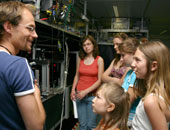
[2007-04-26] Um mehr Mädchen für technische und naturwissenschaftliche Berufe zu interessieren, findet seit einigen Jahren jeweils am letzten Donnerstag im April der „Girls' Day“ statt. Auch die Fakultät für Mathematik, Informatik und Physik und das IQOQI luden diesmal die Töchter ihrer Mitarbeiterinnen und Mitarbeiter ein, einen Blick in die Arbeitswelt ihrer Eltern zu werfen.
Wozu braucht man Mathematik? Wie wird Software entwickelt? Warum verhalten sich Atome wie Wellen? Was sind Galaxienhaufen? Auf all diese Fragen erhielten die Mädchen am Donnerstagnachmittag Antworten. Dr. Mechthild Thalhammer vom Institut für Mathematik erklärte den Mädchen, mit welchen Fragestellungen sich die Mathematik beschäftigt und in welchen Bereichen Mathematikerinnen und Mathematiker tätig sind. Mit einer Software zur Verbesserung der Lebensqualität von chronisch kranken Patienten machte Dr. Barbara Weber und Stefan Zugal vom Institut für Informatik die Besucherinnen bekannt. Sie nutzte das von Studierenden gemeinsam mit der Medizinischen Universität entwickelte Programm, um aufzuzeigen, wie Software in der Praxis entwickelt wird. Nach einer kurzen Erfrischungspause am IQOQI führte Dr. Florian Schreck die Mädchen in das Labor der Experimentalphysiker. Hier konnten sie einen Blick auf ein Experiment werfen, mit dem unter Zuhilfenahme von Laserstrahlen Atome auf extrem tiefe Temperaturen abgekühlt werden. So studieren die Physiker die Atome, die sich bei diesen Temperaturen wie Wellen verhalten. Das hilft ihnen die Quantenmechanik besser zu verstehen. Zum Abschluss dieser interessanten Reise durch die Institute gaben Dr. Wolfgang Kapferer und Mag. Thomas Kronberger vom Institut für Astro- und Teilchenphysik einen Einblick in die Erforschung von Galaxienhaufen. Die größten Strukturen des Universums werden mit Hilfe von Teleskopen, Satelliten und Computersimulationen erforscht. Die Mädchen wurden von Sabine Hofer Brigo durch die einzelnen Stationen geführt. Organisiert wurde die Veranstaltung von der Fakultät für Mathematik, Informatik und Physik und dem Institut für Quantenoptik und Quanteninformation. „Wir öffnen die Türen unser Einrichtungen jungen Menschen immer gerne, weil wir sie für die faszinierende Welt der Naturwissenschaft und Technik begeistern wollen“, so Dekan Rudolf Grimm.
Vielfältige Aktivitäten
Das Institut für Astro- und Teilchenphysik nahm außerdem auch am Girls' Day für Schulen teil, der von der AMG Tirol gemeinsam mit dem Land und der Wirtschaftskammer organisiert wurde. Der Girls’ Day hat seinen Ursprung in den USA und wurde 1993 in New Orleans zum ersten Mal veranstaltet. Unter dem Motto „Take Our Daughters to Work“ lädt der internationale Aktionstag dazu ein, Töchter mit an den eigenen Arbeitsplatz zu nehmen. In vielen Betrieben und Einrichtungen werden an diesem Tag spezielle Programme angeboten, um die Mädchen für technische und naturwissenschaftliche Berufe zu interessieren. Auch heute noch entscheiden sich Mädchen häufig für „typisch weibliche“ Berufsfelder. Von 260 Lehrberufen wählen in Österreich 68% der Mädchen die vier gängigsten Lehrberufe (Einzelhandel, Gastgewerbe, Frisör, Büro). Bei den Burschen sind dies nur 21%. Der Girls' Day soll Mädchen die Gelegenheit geben, die ganze Bandbreite ihrer Möglichkeiten kennen zu lernen und so das Spektrum ihrer Berufswahl erweitern – auch jenseits traditioneller Rollenbilder.